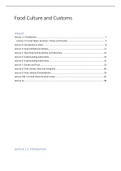Class notes
RSO22306 Food Culture and Customs, Lecture Notes / Summary
- Course
- Institution
Notes of all the lectures given during the Course Food Culture and Customs. It contains everything you need to know for the exam. By using these notes I passed this course with an 8.0.
[Show more]



